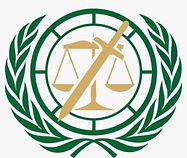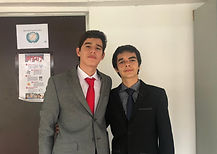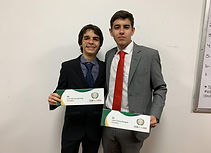Security Council

The United Nations Security Council was established under the 5th chapter of the United Nations Charter the 26th of June of 1945. After World War I and World War II, the world had faced its worst expressions of chaos and violence, leaving humanity in diplomatic disorder and nations vulnerable to further conflicts.
The Official CCBMUN will be covering two topics, 'The Future of UN Peacekeeping' and 'Open Agenda'
Henceforth, the victors of the wars decided to establish the United Nations (and its Security Council) as an international entity bound to prevent the outbreak of similar conflicts and to maintain worldwide peace. The Security Council is the main organism in the United Nations that works to maintain international peace and security, and addresses problematic issues present all around the globe to ease tensions and neutralize threats against its fundamental mission.
Topics
Model
Topic 1: The Future of UN Peacekeeping
Topic 2: Open Agenda
Presidents

President: Antonio Robles
School: Colegio Bolivar
President: Tomás Jaramillo
School: Colegio Colombo Británico
Contact: sc@ccbcali.edu.co
The United Nations Security Council was established under the 5th chapter of the United Nations Charter on 26th of June, 1945. After World War I and World War II, the world had faced its worst expressions of chaos and violence, leaving humanity in diplomatic disorder and nations vulnerable to further conflicts. As a result, the victors of the wars decided to establish the United Nations (and its Security Council) as an international entity bound to prevent the outbreak of similar conflicts and to maintain worldwide peace. The Security Council is the main organism in the United Nations that works to maintain international peace and security, addressing problematic issues from all over the world, in order to ease tensions and to neutralize threats against its fundamental mission.
We expect our delegates to adopt an active position in the discussion of the topics, applying critical thinking and creativity skills to protect their nations’ interest in a tactical way, whilst ensuring international peace and security through novel solutions. As presidents, we are looking forward to witnessing the progress of this commission, which has been of crucial importance in the development of the human race.
"
CCBMUNXVIII
Day 1
By: Catalina Gómez
The delegates of the Security Council will be discussing the future of the UN peacekeeping. In 1948, the United Nations Security Council formed the United Nations Peacekeeping Missions when they authorized the deployment of UN military groups to the Middle East.
Currently, the UN counts with 13 active peacekeeping missions which span across 3 continents, and is still looking to expand its peacekeeping reach into more hostile regions such as Iraq, Iran and Syria. Although to decide what should be done with current peacekeeping missions, the UN needs to analyze and weigh the pros and cons of past peacekeeping chapters in order to do this. Some key points of the debate will be the Security Council's role in UN Peacekeeping and the influence of the committee on the future of the peacekeeping missions, the Reforms to the way in which Peacekeeping is managed by the UN and the implementation of A4P (Action for Peace Program) and its effect on UN peacekeeping and global security.
The day started with the opening speeches and was followed by a debate, in which France agreed with China to start looking for solutions, and unite delegations. The topic of gender equality was also discussed and was stated as something important to take into account in this commission. Regarding the opening speeches, the Republic of China stated that it is looking forward to an agreement. The United States believed that it was important to target certain aspects of peacekeeping and human rights, to create strategies to reduce gender equality issues. France as well is willing to “help the organization to look and search for global peace” and Iran states that it is open to new efforts to be able to change and perfect the organism in order to keep peace and maintain human rights.
Along the debate, China proposes that countries that are funding such as the United States, instead of just sending peacekeepers to the missions, they should focus mainly in stopping the creation of this conflict and solve this problems by the root, otherwise all the humanitarian help destined to the cause is never going to work, as the problem is going to continue. France highlighted that none of the 13 missions are operating in America, and that not only the Middle East needs this kind of help. The US intervened and said that one of the biggest problems of this commision, is that some of these missions were sometimes being biased, and this is something of all the delegations' concern.
Yemen's proposal is to reform the blue helmets. The US was concerned with helping underdeveloped nations cope with corruption and Human Right abuses. France based their interventions on accepting or rebuilding the A4P treaty and finally, Russia and China formed an alliance and proposed the establishment of an overlooking entity to supervise peacekeeping interventions.
Day 2
By: Catalina Gómez
The debate in Security Council today has revolved around reaching a consensus. In the morning, the blocs consisting of Iran, Pakistan and Syria wrote their draft resolution while France and the US finished theirs. Both were strong and very different which caused France and the US to employ their veto powers and thus no resolutions were approved by the committee. On behalf of the presidents wish, the committee started debating on what they would change on the other bloc’s draft resolution in order to make it viable so the committee arrives at a solution. Delegates begin debating and quickly found out that due to the different foreign policies reaching a consensus would not be easy. After a 30 minutes unmoderated caucus, both blocs got together to rewrite a resolution that would be viable for the international community. This resolution, was consequently approved making the Security Council a perfect example of international collaboration and the true mission of the UN.
CCBMUNXVII
Simulation Day
The effects of Mexican drug cartels on regional stability
By: Penelope Ashe
The United Nations security council, which consists of fifteen members of the UN. Five are permanent (The Republic of China, France, the Russian Federation, the United Kingdom, and the United States of America), and 10 other members that are elected every 1-2 years. The current situation in this commission is regarding Mexican Drug Cartels and their effects on the region’s stability.

Mexico has a long history regarding drug trafficking, which has seemed to worsen in different aspects over time. Several cartels rose to power, and issues started to intensify as the mobs started to fight each other for produce, merchandise, territory and money. They all competed to maintain a powerful position in the drug world, and they all used Mexico as a “bridge” to smuggle drugs into the United States.
The drug business went cold in Mexico momentarily, but it quickly rose back post- 1990’s, when the Colombian drug cartels lost power and the Mexicans took over the cocaine business. This very issue compromises regional safety since the drug business is known to be vastly dangerous and violent. The country’s safety was mildly restored after 2012 when Enrique Peña Nieto was elected president, and he shifted the strategy to solve crime in Mexican territories. Peña Nieto didn’t think fighting fire with fire was the solution (Something that the former Mexican president, Felipe Calderón, was known for doing, by killing drug lords and dealers to fight crime). Peña Nieto disagreed with Calderón’s ideals and instead thought the main focus and priority was law enforcement and achieving safety through the law. He focused on implementing law regulations excessively to fight crime, but this was slammed by controversy, as Peña Nieto’s intents were faced by more corruption, kidnappings and rebel groups. This left his reputation severely tarnished, as people considered him to be incompetent and useless.

This war against drugs took 130 politician’s lives last year alone, causing a worldwide fear regarding safety for journalists, politicians or tourists, in general, visiting Mexican territories.
It seems like Mexico’s neverending situation has no solution, with crime rates increasing and drug prices going up with their demand, the fight against drugs seems to be nearly impossible to fight.
Day 1
Security Council Topic #1: Conflict between Turkey and Kurdish Group
By: Maria Fernanda Romano
The United Nations’ Security Council is a commission dedicated to the prevention of possible future outbreaks of violent conflicts in order to maintain world peace. Due to its vitality, this commission is the main organism of the United Nations and throughout their reunions, important topics are treated such as various problematic issues that threaten world peace.

Today, the commission of Security Council debated the topic of the last longing conflict in Turkey between them and the Kurds, a stateless group that lives as a minority in the Turkish territory. The debate was centered around the constant repression the Turkish government inflicts against the Kurds, and according to this country’s constitution their inexistence in their territory. A lot of powerful points of view were proven from diverse countries such as the delegation of Peru, China, Syria and the representative of the PPK group, and the Islamic State (ISIS).

Some remarkable events that took place in today’s informal debate are for example, the controversy that was created when most delegations were against the treatment the Turkish government has had on the Kurdish group. Also, the crucial intervention of the delegate of Peru that in order to guide the debate in the necessary path she proposed a new motion called Democratic Agenda which basically was about stating the most important aspects that had to be debated mandatorily in the course of the day. Most importantly, a lot of viable solutions were proposed by the delegate of Iraq which made the whole commission consider the option of intervening this conflict as a armed conflict.
Day 3
The implications of peace and conflict
By: Carolina Agudelo
To start off the second and last day of the MUN in the Security Council a formal debate was initiated giving each delegate one minute in order to restate their position about the matter at hand. Next proceeded a brief lobby time period in order for delegates to formulate solutions and possibilities for the problems at hand. The PKK managed to make alliances with Russia, Syria and Mexico, their press release then suggested “The Russian Federation considers that Turkey should be punished for crimes against humanity by violating the international human rights treaties and also its own constitution, taking that into account Turkey should also consider recognizing the kurd as a political group and giving them guvernamental Representation.”. Turkey made allies with Iran drafting a press release that suggested a more peaceful alternative. The press release 1.1 (Turkey, USA, and the majority of the delegates) are all looking for a pacific solution to the conflict between Turkey and Kurdish armed groups while The PKK wants to resolve this conflict with more conflict. Voting took place and the pacific press release took the winning vote.
For the Open Ayenda the tension between Iran and the USA was discussed, for some background information Iran has been producing more plutonium that is allowed and so comes the need for straightening this lack of order, the USA, felt it had no other choice but to gain military action against Iran, and ever since there has been military conflict between these two nations. The UNSC has made the decision to make this a matter to be debated by the delegates. As a matter of fact the Security Council is willing to try and solve problematics regarding global security and international affairs.
